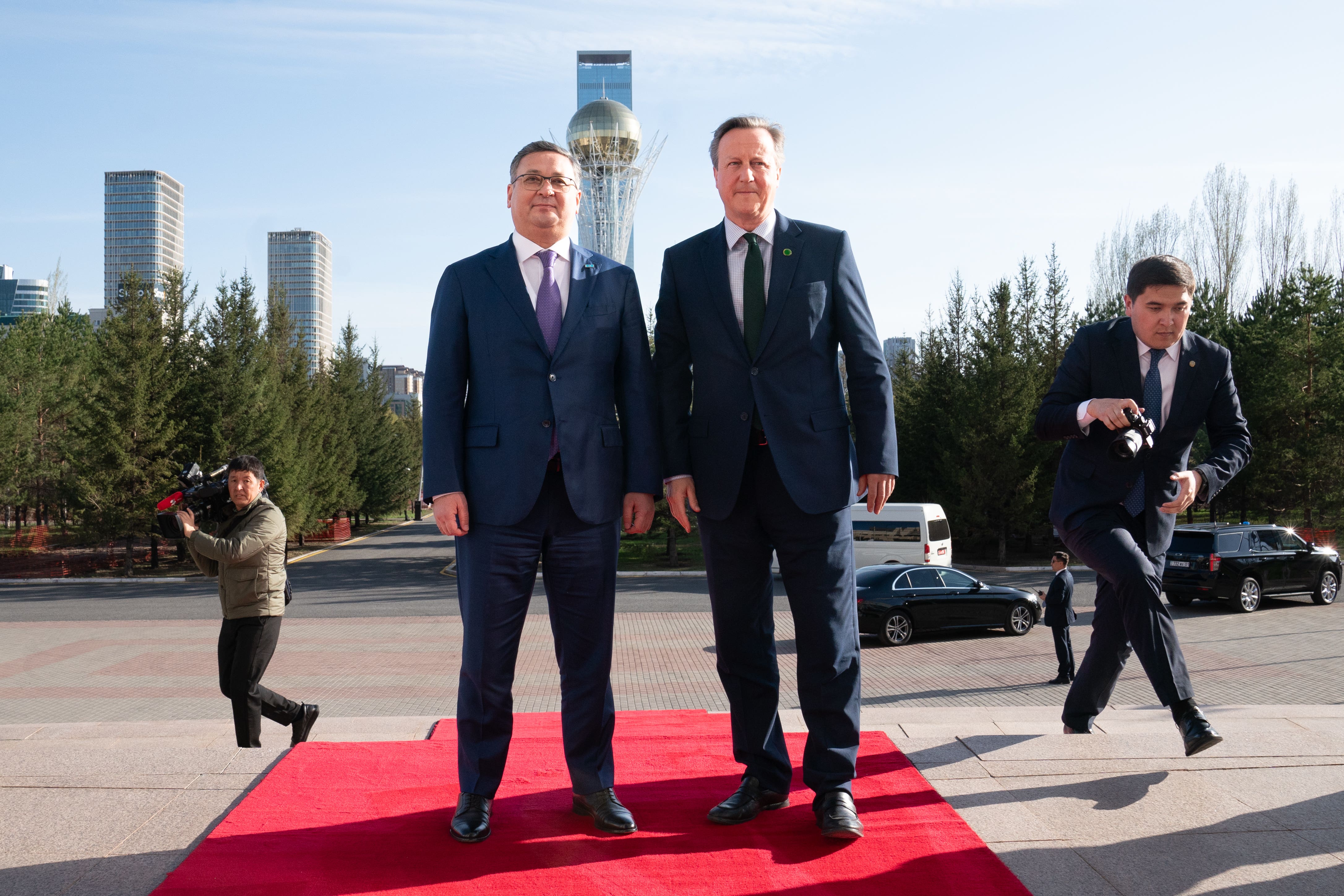Public spending ‘trade-offs’ needed to meet defence pledge, Cameron accepts
During a visit to Central Asia, Lord Cameron said the commitment was ‘necessary’ to protect national security as ‘the first priority of government’.

Your support helps us to tell the story
From reproductive rights to climate change to Big Tech, The Independent is on the ground when the story is developing. Whether it's investigating the financials of Elon Musk's pro-Trump PAC or producing our latest documentary, 'The A Word', which shines a light on the American women fighting for reproductive rights, we know how important it is to parse out the facts from the messaging.
At such a critical moment in US history, we need reporters on the ground. Your donation allows us to keep sending journalists to speak to both sides of the story.
The Independent is trusted by Americans across the entire political spectrum. And unlike many other quality news outlets, we choose not to lock Americans out of our reporting and analysis with paywalls. We believe quality journalism should be available to everyone, paid for by those who can afford it.
Your support makes all the difference.Lord Cameron has acknowledged that public spending “trade-offs” will be needed to meet the Government’s pledge to increase the defence budget, after Prime Minister Rishi Sunak declined to rule out cuts beyond the civil service.
The Foreign Secretary said the announcement to raise spending to 2.5% of GDP by 2030 was a “very clear demonstration” of the Conservative Government’s priorities.
Mr Sunak says it will be funded by cutting 72,000 civil service jobs, but economists have said the commitment will hit other areas as well.
During a five-day visit to Central Asia, Lord Cameron said the commitment was “necessary” to protect national security as “the first priority of government”.
All spending decisions are trade-offs because if you spend a pound on one thing you can't spend it on something else, and this is a very clear demonstration of the Conservative Government's priorities in terms of making this happen
Asked whether public spending trade-offs beyond the civil service were needed to fund the pledge, he said: “All spending decisions are trade-offs because if you spend a pound on one thing you can’t spend it on something else, and this is a very clear demonstration of the Conservative Government’s priorities in terms of making this happen.”
In an election year, the Tories hope the Prime Minister’s commitment will be a key dividing line with Labour, which has also said it will raise the budget to 2.5%, only when economic conditions allow.
The 2030 pledge was previously made by Boris Johnson in 2022 following Russia’s invasion of Ukraine.
Asked how Mr Sunak’s announcement differed from the former prime minister’s promise to raise defence spending to 2.5%, the Foreign Secretary said: “There’s a great difference between making a pledge and actually having a plan to achieve a pledge.”
Lord Cameron, who cut defence spending to 2.03% of GDP while he was in Number 10, added: “I’ve sat in the chair where you have to make decisions about who gets what spending. This is a really important commitment because of the challenges we face internationally.”
Meanwhile, at a press conference in Berlin, Mr Sunak was asked whether his defence increase will mean tax rises and deep cuts, which he rejected as “not a fair characterisation”.
He said the plan is “fully funded” with a reduction in the civil service headcount and an uplift in research and development spending, but added that “we are making a choice to prioritise defence”.
Pressed to rule out further cuts, the Prime Minister said: “We have record investment in our public services, including the NHS – that’s not going to change, it’s going to continue.
“We have record investment in our schools – that’s not going to change, it’s going to continue to increase. And alongside that we are able to cut people’s taxes.”
The current Nato target for defence spending is 2% – although only 11 members of the alliance met that goal in 2023.
After Mr Sunak’s announcement on Tuesday, the UK Government has said it wants that benchmark to increase to 2.5%, which would add £140 billion to the Nato budget if met by all 32 members.
The Institute for Fiscal Studies (IFS) has said unprotected areas of public spending will now face cuts of about 4% a year after 2025 to help meet the defence commitment.
Downing Street said the plan would cost £4.5 billion in 2028/29, of which £2.9 billion would come from savings because of the reduction in the size of the civil service, with £1.6 billion coming from the research and development budget.
No 10 would not give any further details of where jobs would be lost or whether the reduction in headcount could be achieved through natural wastage or if it would require redundancies.
Details will be set out at a future spending review, a spokeswoman said.
Labour has said the Tories “have shown time and time again that they cannot be trusted”.
Shadow defence secretary John Healey said that “since 2010, the Conservatives have wasted more than £15 billion mismanaging defence procurement, shrunk the army to its smallest size since Napoleon, missed their recruitment targets every year, and allowed morale to fall to record lows”.